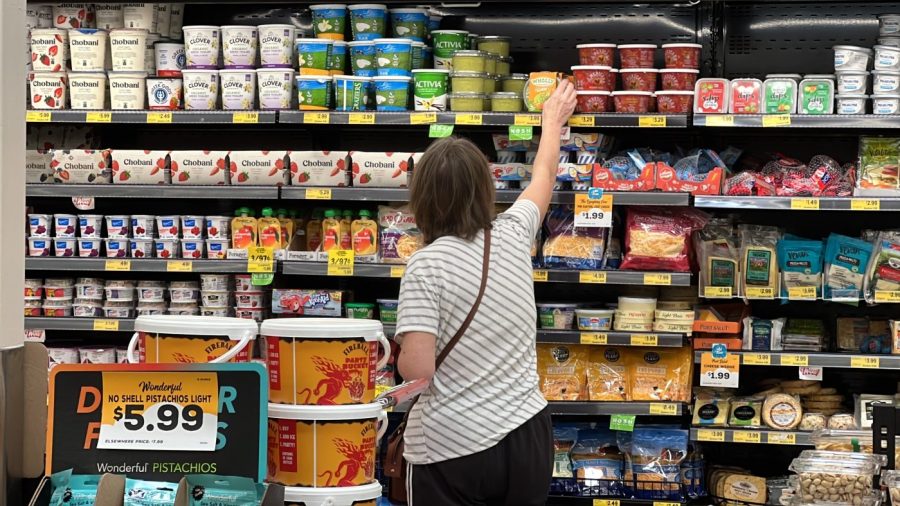Inflation eases as corporate profits fall from record levels
Inflation is cooling as corporate profit margins fall from record levels.
The annual inflation rate reached 5 percent in March, falling from 6 percent the month prior, according to Labor Department data released Wednesday. Prices rose just 0.1 percent on a month-to-month basis, the smallest increase since December.
Behind the numbers What slowing corporate profits mean for inflation
That comes as S&P 500 companies saw their earnings decline by an average of 6.8 percent in the first quarter of 2023, according to an analysis from FactSet. It’s the largest profit decline since the onset of the pandemic.
How profits and inflation rose together
The red-hot inflation rate has aligned with growing corporate profit margins that soared to record levels in 2022. Executives in many sectors acknowledge that markups are the primary driver behind their earnings, with price hikes more than making up for elevated input costs.
Federal Reserve Chairman Jerome Powell has consistently linked inflation to wage growth. But he told lawmakers last month that falling corporate profit margins could also help bring inflation down in the short term.
Rewind: Will companies bring down prices to help lower inflation? So far, some have ‘no regrets’
The largest packaged food, consumer staple and automotive companies are increasingly making their money on huge margins, even while price hikes cause their sales volumes to fall.
Economic headwinds and recession fears could test that strategy. Companies can only afford to charge high prices if consumers are willing to pay. If sales volumes fall too much, corporations would have to lower prices to remain competitive.
Why companies are dialing back price hikes

Grocery prices, which have remained stubbornly high, actually decreased 0.3 percent in March after several months of painful increases. That comes after executives at the largest food companies said they wouldn’t be as aggressive with price hikes going into 2023.
Conagra Brands, the maker of SlimJim and other packaged foods, reported $342 million in quarterly profit last week, up nearly 60 percent from the same period last year.
Conagra’s chief financial officer Dave Marberger said on an earnings call that its sales growth was driven by “inflation-justified pricing actions.”
While the company’s sales volumes fell 9 percent, prices improved by 15.1 percent. Competition from cheaper private label brands has had a “limited impact,” Conagra executives told investors.
Jon Nudi, president of North American Retail at General Mills, told investors last month that customers are largely sticking with the company’s brands despite consistent price hikes. He credited General Mills’ marketing efforts.
“With the amount of pricing that we’ve taken, historical elasticities would suggest much bigger declines,” Nudi said.
Still, corporate executives acknowledged that their customers may not stay loyal forever.
Constellation Brands chief financial officer Garth Hankinson told investors last week that the wine, beer and spirits company “will continue to monitor inflationary dynamics and potential recessionary risks to ensure our pricing is appropriately balanced to support the momentum of our brands.”
Economists largely agree that COVID-19 supply chain shocks, Russia’s invasion of Ukraine and a labor shortage that drove up wages have fueled inflation, which is prevalent globally.
But experts are increasingly pointing to record corporate profit margins, too. A January study from economists at the Kansas City Federal Reserve found that corporate price hikes accounted for more than half of inflation in 2021.
University of Massachusetts Amherst professors wrote in a recent study that the presence of high inflation and supply chain bottlenecks “serve to create legitimacy for price hikes and create acceptance on the part of consumers to pay higher prices.”
In many cases, corporations are charging more because they can.
Where prices are rising the most

As bird flu outbreaks reduced the supply of hens, top U.S. egg producer Cal-Maine Foods doubled the price of eggs and saw its profits soar more than 700 percent, even though the company had no reported cases of bird flu at its facilities.
Democrats have called for an investigation into pricing strategies by egg producers, which have insisted that price hikes are driven solely by supply and demand.
Egg prices were up 70 percent annually in January but saw huge declines in recent months amid falling wholesale prices. Egg prices are now up 36 percent compared to March 2022.
Other key food categories, including meat, fruits and vegetables saw their price fall last month. The cost of energy and medical services also declined.
But the cost of housing, transportation services, new cars, apparel and motor vehicle insurance continued to rise in March even as overall inflation eased.
“Hopes for further relief for household budgets is contingent on seeing these moderating price pressures sustained for a number of months across a broad range of categories,” Bankrate chief financial analyst Greg McBride said in a note.
In the automotive sector, companies have embraced high-priced vehicles, abandoning sales volume for huge margins. Within five years, the percentage of cars sold for under $25,000 has fallen from 13 percent to 4 percent, according to Cox Automotive.
Copyright 2023 Nexstar Media Inc. All rights reserved. This material may not be published, broadcast, rewritten, or redistributed.

